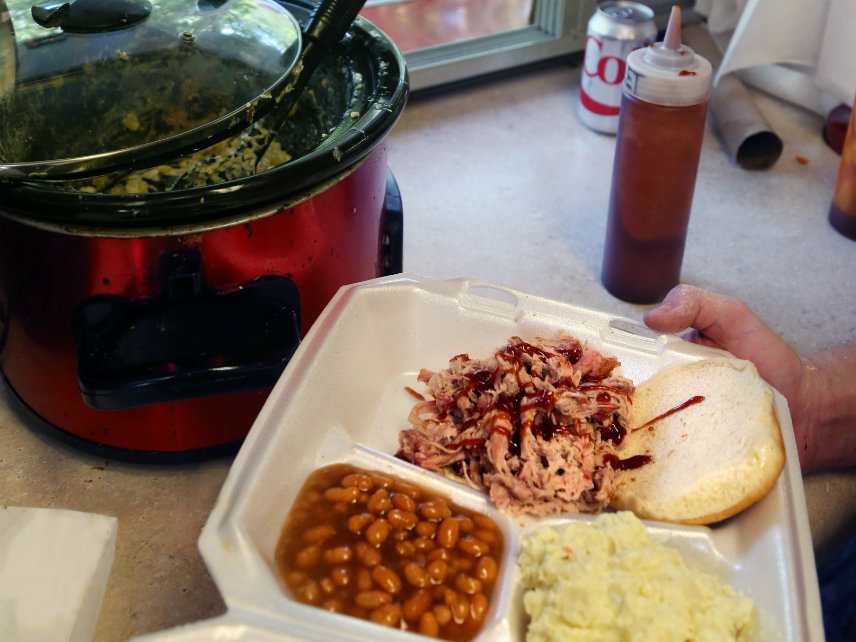Florida Town Booted Food Truck Offering Meals to Hurricane Survivors After Nearby Restaurant Complained
Mayor says the town doesn't ban food trucks, but only allows them on certain days. And that's one rule that can't bend even in the wake of a major hurricane.

A few days after Hurricane Irma blasted through the town of Green Cove Springs, Florida, Jack Roundtree drove his Triple J's BBQ truck downtown to give residents a hot lunch and hand out free bar-be-que to utility workers trying to get the power restored.
It didn't take long for the cops to show up.
According to Clay Today, a news website for the community south of Jacksonville, the cops told Roundtree his food truck had to go. City manager's orders. Roundtree didn't have a permit to operate in Green Cove Springs, and not even the aftermath of a devastating hurricane was going to stop the city government from enforcing that law.
Local resident Bettie Tune witnessed the incident and later posted on Facebook about it.
Brandi Acres, a spokeswoman for the Green Cove Springs Police Department, confirmed to Reason that a food truck was sent away on the day after Irma struck, but Acres said she could not provide any additional details on the incident or confirm the name of the food truck. An employee at Triple J's BBQ confirmed the incident occured but declined to answer any questions or comment.
Green Cove Springs Mayor Mitch Timberlake this morning says he did not consider Roundtree's gesture "a Good Samaritan situation." Had the operators of the food truck come to city officials and asked for permission, Timberlake says, officials would have been happy to direct the food truck to where utility workers were in need of food.
"That didn't happen," he said.
A local restaurant complained to city officials about the rogue food truck set up along U.S. Route 17 near downtown, Timberlake said. The city licenses food trucks only a few days per year for festivals or celebrations, like Memorial Day, the mayor says.
"He is a commercial food truck operator, and he knows the local ordinances for food truck operation and had a responsibility to reach to the city to get a permit for what he wanted to do," Timberlake says. "We don't prohibit food trucks. There are times and places where we welcome them."
The aftermath of a devastating hurricane is not one of those times. Timberlake spoke of the "tremendous debris" in the wake of the storm, and 90 percent of the city was without power. More than 100 trees were down across the city and extensive property damage to homes along the St. James River, which flows past the city. Half of the city was still without power Wednesday when the Triple J's food truck got the boot.
With all of those challenges, it was remarkable city officials and police could maintain their focus on rules protecting unsuspecting hurricane victims from a hot meal on wheels. And quite a feat for a restaurateur to look past the devastating damage to track down city officials (city hall was closed; they operating from an emergency management shelter) and rat out one lousy food truck.
Ari Bargil, an attorney with the Institute for Justice, a national libertarian law firm, said the incident in Green Cove Springs illustrates the problems that food truck entrepreneurs can face in many localities around the country.
"This guy was trying to feed people who had few other options in the aftermath of a hurricane," Bargil says. "This is a perfect example of how overblown regulations burden entrepreneurs."
Bargil is the lead attorney on a lawsuit challenging food truck regulations in Baltimore, where city officials have banned food trucks from operating within 300 feet of an brick-and-mortar restaurant. The case will go to trial next week in Maryland state court.
Timberlake says he doesn't see his city's policies as discriminatory towards food trucks or protectionist towards restaurants. "The local citizenry wants to have a healthy restaurant business," he says. "The people who come into town, put up a business, have a building, employ numbers of people from the town deserve to make sure that someone doesn't come in and set-up next door to them without the overhead costs they endured and run a business."
Towns are allowed to write their own rules, of course. If the local government wants to shut out one form of business in favor of another—well, that's probably a mistake. But it's hardly the only place to make it.
Still, how important are the rules for one food truck during an emergency? Negligible to hungry, tired people cleaning up and trying to get their power back. Still, Green Cove Springs showed a commitment to protectionism under duress that's difficult to match.


Show Comments (77)